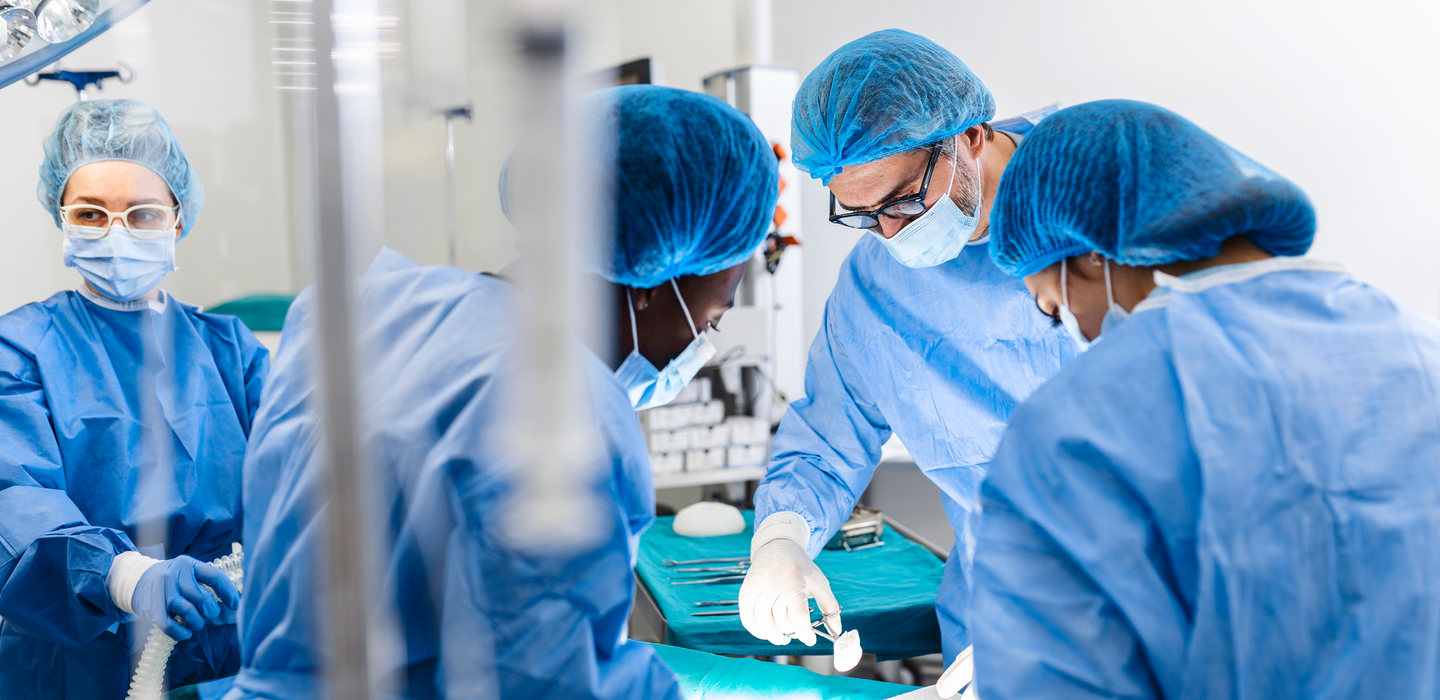Our New Jersey experts performed the first laparoscopic Bypass and Banding in the state!

Gastric Bypass
Gastric Bypass | Roux-en-Y
Discover the “gold standard” in weight-loss surgery
The gastric bypass is considered the GOLD STANDARD for weight loss surgery. It has been studied for nearly 30 years, and now over 90 percent of these procedures are performed using laparoscopic techniques due to their safety record.
Our highly skilled, board-certified surgeons are national pioneers in this procedure. They have the largest experience in laparoscopic weight-loss surgery in New Jersey and, in fact, performed the first laparoscopic gastric bypass and laparoscopic gastric banding in the state.
Major weight loss surgery, minimally invasive
Unlike conventional “open” gastric bypass surgery, which often requires a foot-long incision, laparoscopic surgery avoids any large incisions. Instead, our physicians operate through tiny openings, about the size of buttonholes, while viewing the patient’s internal organs on a high-definition TV monitor. Since there is no large incision to heal, patients have less pain and scarring and recover more quickly.
Roux-en-Y Gastric Bypass
The Roux-en-Y (pronounced ROO-on-why) procedure functions in two ways. First, part of the stomach is sectioned off, strictly limiting the amount of food that can be eaten at one time. Second, part of the intestine is bypassed, limiting the body’s ability to fully absorb all of the calories that are eaten. This procedure is generally not reversible.
How it Works: Laparoscopic Gastric Bypass
Laparoscopic gastric bypass surgery (Roux-en-Y) is generally considered to be the best surgical procedure for the treatment of morbid obesity. Weight loss is achieved by reducing the functional portion of the stomach to a pouch about the size of an egg and by bypassing about 100 cm. to 150 cm. of small intestine.
After the gastric bypass procedure, the egg-sized stomach pouch causes the patient to have a sensation of fullness after eating only a small portion of food. Additionally, only a very small opening from the stomach pouch to the intestine is intentionally created during surgery to delay stomach emptying, making the sensation of fullness last longer.
The intestinal bypass portion of the procedure separates the digestive juices from the food for about 100 cm. to 150 cm. This prevents the digestion and absorption of food during the time it is separated from the digestive juices. Once the food does meet with the digestive juices, the digestive process starts; however, the creation of these permanent anatomic changes results in less absorption of nutrients and contributes to weight loss.
Robotic Gastric Bypass
At Advanced Laparoscopic Associates, we specialize in performing robotic gastric bypass. It is similar to minimally invasive gastric bypass surgery, but we use an advanced surgical robot. Studies suggest that, compared to laparoscopic gastric bypass, robotic gastric bypass has similar rates of complications, length of hospital stays and recovery time, making it a safe, effective way to perform gastric bypass surgeries.
The surgeon sits at a console and manipulates four robotic arms. Three of the arms hold surgical tools and are capable of incredibly precise movements. The fourth contains a camera used to visualize the abdominal cavity, providing a high-definition 3D view unavailable with any other surgical camera.
After Gastric Bypass Surgery
Patients will be on a clear liquid diet for the first week immediately following gastric bypass surgery and then advance to a pureed diet for one week. These foods will be very soft so as to pass through the small, newly formed pouch. The third week consists of soft solid foods.
Approximately one month after the gastric bypass surgery, patients can expect to eat more regular table foods. Patients at this point will still be learning how to eat right, including chewing food carefully, learning to drink liquids between rather than with meals, and learning that eating the wrong foods, such as sweets or fatty foods, can cause the “dumping syndrome.”
At six months after the gastric bypass surgery, most patients will be on their long-term maintenance diet, which is more or less what and how they will eat for the rest of their lives. The maintenance diet for the most part consists of regular table foods, but in small portions. Most patients describe their meals as child-sized, and they often do not finish what they are served. Patients generally become comfortable eating these small meals and almost always say the loss of the ability to enjoy large meals or certain foods is more than compensated for by being able to successfully control their weight.
Patients may expect to lose approximately 75 percent of their excess body weight during the first two years following surgery.* Sometimes a weight regain of about 10 percent is seen between years two and five, perhaps because the small pouch increases in size and perhaps because patients learn how to take in extra calories without realizing it.
*Disclaimer: Results may vary.
Complications
Complications after gastric bypass are rare but can be serious. As described in the seminar, a leak from the surgical connections can result in a potentially serious abdominal infection. Other problems may include but are not limited to: bleeding, injury to other organs, blood clots, pulmonary embolism, narrowing at the connections, wound infection, and anesthetic complications. Lifelong vitamin supplementation is required or serious deficiency may develop. Screening is provided at routine postoperative visits. Future endoscopic or surgical procedures may be required. Any gastrointestinal problems should be brought to the attention of your surgeon at any time after your surgery. Pregnancy occurring greater than two years after surgery is safe with appropriate nutrition counseling.
For additional information, all prospective patients are invited to attend a free educational seminar.
Seminars are a great source of information about the procedure you are considering, and they allow you to meet the surgeons as well as ask any questions you may have. You may also have the opportunity to meet some post-operative patients.
Call (201) 646-1121 today and schedule your consultation with one of our surgeons!
Or use our online Request an Appointment form.
